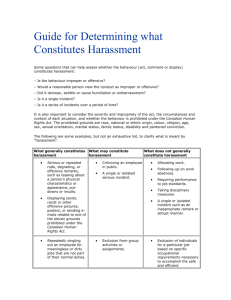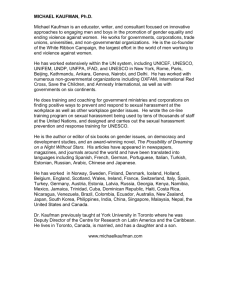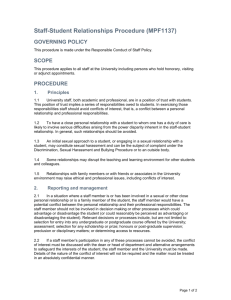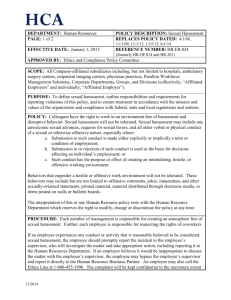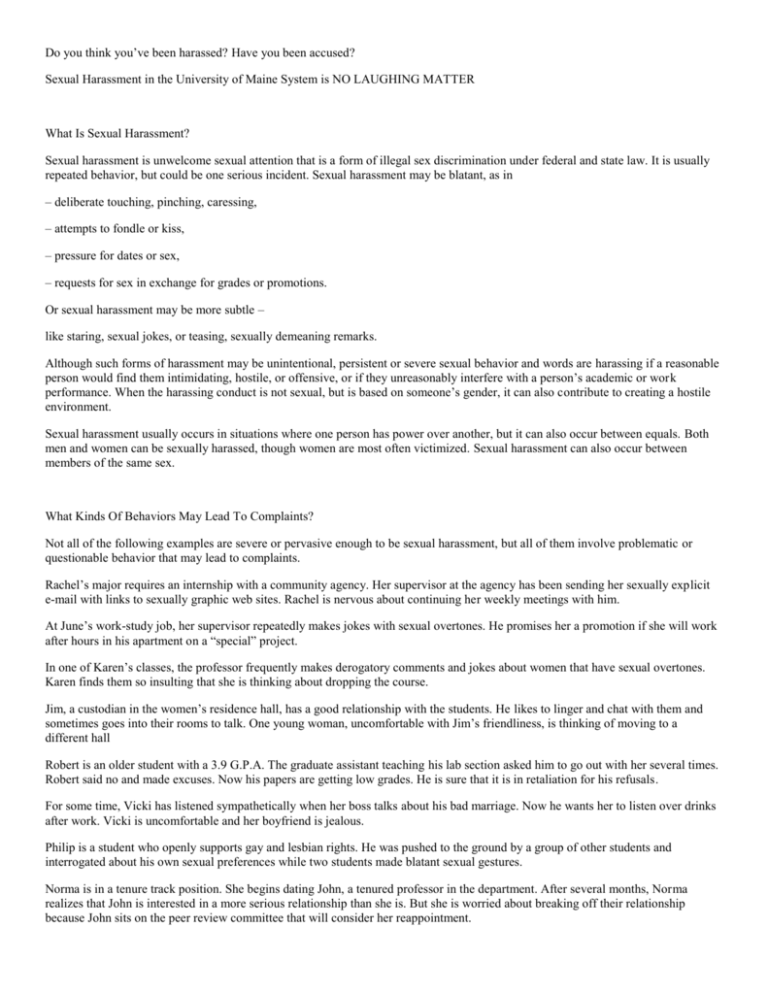
Do you think you’ve been harassed? Have you been accused?
Sexual Harassment in the University of Maine System is NO LAUGHING MATTER
What Is Sexual Harassment?
Sexual harassment is unwelcome sexual attention that is a form of illegal sex discrimination under federal and state law. It is usually
repeated behavior, but could be one serious incident. Sexual harassment may be blatant, as in
– deliberate touching, pinching, caressing,
– attempts to fondle or kiss,
– pressure for dates or sex,
– requests for sex in exchange for grades or promotions.
Or sexual harassment may be more subtle –
like staring, sexual jokes, or teasing, sexually demeaning remarks.
Although such forms of harassment may be unintentional, persistent or severe sexual behavior and words are harassing if a reasonable
person would find them intimidating, hostile, or offensive, or if they unreasonably interfere with a person’s academic or work
performance. When the harassing conduct is not sexual, but is based on someone’s gender, it can also contribute to creating a hostile
environment.
Sexual harassment usually occurs in situations where one person has power over another, but it can also occur between equals. Both
men and women can be sexually harassed, though women are most often victimized. Sexual harassment can also occur between
members of the same sex.
What Kinds Of Behaviors May Lead To Complaints?
Not all of the following examples are severe or pervasive enough to be sexual harassment, but all of them involve problematic or
questionable behavior that may lead to complaints.
Rachel’s major requires an internship with a community agency. Her supervisor at the agency has been sending her sexually explicit
e-mail with links to sexually graphic web sites. Rachel is nervous about continuing her weekly meetings with him.
At June’s work-study job, her supervisor repeatedly makes jokes with sexual overtones. He promises her a promotion if she will work
after hours in his apartment on a “special” project.
In one of Karen’s classes, the professor frequently makes derogatory comments and jokes about women that have sexual overtones.
Karen finds them so insulting that she is thinking about dropping the course.
Jim, a custodian in the women’s residence hall, has a good relationship with the students. He likes to linger and chat with them and
sometimes goes into their rooms to talk. One young woman, uncomfortable with Jim’s friendliness, is thinking of moving to a
different hall
Robert is an older student with a 3.9 G.P.A. The graduate assistant teaching his lab section asked him to go out with her several times.
Robert said no and made excuses. Now his papers are getting low grades. He is sure that it is in retaliation for his refusals.
For some time, Vicki has listened sympathetically when her boss talks about his bad marriage. Now he wants her to listen over drinks
after work. Vicki is uncomfortable and her boyfriend is jealous.
Philip is a student who openly supports gay and lesbian rights. He was pushed to the ground by a group of other students and
interrogated about his own sexual preferences while two students made blatant sexual gestures.
Norma is in a tenure track position. She begins dating John, a tenured professor in the department. After several months, Norma
realizes that John is interested in a more serious relationship than she is. But she is worried about breaking off their relationship
because John sits on the peer review committee that will consider her reappointment.
A resident in Mary’s hall has been “coming on” to her; though she tries to ignore his behavior, it is getting worse. He stares at her,
comments on her clothing and plays with her hair. Late last night he came to her door loudly asking to sleep with her, and wrote
obscenities on her memo board when she refused. Mary’s friends are saying, “Watch out for him.”
What Is The University’s Policy?
The University of Maine System is committed to providing a positive education and work environment for all students and staff.
Sexual harassment, whether intentional or not, undermines the quality of this climate and is against the law. The University has a legal
and ethical responsibility to ensure that all students and employees can learn and work in an environment free of sexual harassment.
The Board of Trustees has adopted this policy regarding sexual harassment:
Sexual harassment of either employees or students is a violation of federal and state laws. It is the policy of the University of Maine
System that no member of the University System community may sexually harass another. In accordance with its policy of complying
with non-discrimination laws, the University System will regard freedom from sexual harassment as an individual employee and
student right which will be safeguarded as a matter of policy. Any employee or student will be subject to disciplinary action for
violation of this policy.
In conformance with this policy, the University of Maine System will ensure fair and impartial investigations that will protect the
rights of the person(s) filing sexual harassment complaints, the person(s) complained against, and the institution or unit. Retaliation
against anyone who makes a complaint of sexual harassment or who is involved in a complaint process will not be tolerated.
Consenting relationships may constitute sexual harassment under this policy. When a professional power differential exists between
members of the University of Maine System and a romantic or sexual relationship develops, there is a potential for abuse of that
power, even in relationships of apparent mutual consent. Faculty and staff members are strongly advised not to engage in such
relationships. Further, the University System prohibits the abuse of power in romantic or sexual relationships.
To assure that power is not abused and to maintain an environment free of sexual harassment, a faculty or staff member must
eliminate any current or potential conflict of interest by removing himself or herself from decisions affecting the other person in the
relationship. Decisions affecting the other person include grading, evaluating, supervising, or otherwise influencing that person’s
education, employment, housing, or participation in athletics or any other University System activity.
Unwelcome sexual advances, requests for sexual favors, and other verbal or physical conduct of a sexual nature constitute sexual
harassment when:
1. submission to such conduct is made either explicitly or implicitly a term or condition of an individual’s employment or education;
2. submission to or rejection of such conduct by an individual is used as the basis for academic or employment decisions affecting the
individual; or
3. such conduct has the purpose or effect of interfering with an individual’s academic or work performance or creating an intimidating,
hostile or offensive employment, educational or living environment.
What Are The Effects Of Sexual Harassment?
People who are subjected to sexual harassment often feel powerless to stop the situation. Especially in this culture, where “no” is often
heard as “yes,” verbal refusals are frequently ineffective. People may also fear retaliation if they say “no.”
People who experience sexual harassment often blame themselves. Others may also blame them for the problem, rather than holding
the harasser responsible for the behavior.
All effects are harmful. Sexual harassment is not funny; it is degrading and upsetting. It is not “just the way things are.” People who
feel harassed have dropped courses, changed majors, avoided advisors, even quit jobs or school.
What About “Consenting” Relationships?
University policy strongly discourages consenting romantic or sexual relationships between members of the University community
when one person has power or authority over the other. The trust and respect that students have for faculty and other staff can make it
difficult for them to freely reject sexual advances. Because faculty and staff have the power to give or withhold rewards such as praise,
grades, and recommendations, this further limits the extent to which a sexual relationship between faculty or staff and students can be
considered truly consensual. There are similar problems with an apparently consenting relationship between supervisor and employee.
Even if a subordinate student or employee does not appear to object to a sexual relationship, this does not mean that the person
welcomes the relationship. Moreover, someone else may claim that the participant in a consenting relationship received preferential
treatment and may file a complaint of sex discrimination against the faculty member or supervisor.
Some students – such as RA’s and peer tutors – may also be in a position of apparent authority over other students and should be alert
to the risks of consenting relationships.
Sexual relationships that may result in complaints of sexual harassment or sexual favoritism and that create a conflict of interest
include, for example, those between:
A faculty member and student who is enrolled in the faculty member’s course, who is enrolled in a program for which a course taught
by the faculty member is a requirement, who is an advisee of the faculty member, or whose academic work is supervised by the
faculty member;
A faculty or staff member and student if the faculty or staff member is in a position to evaluate or otherwise influence the student’s
education, employment, housing, or participation in athletics or any other University activity (staff members include, for example,
graduate assistants, administrators, coaches, advisors, program directors, counselors, health center staff, and residential life staff);
An employee and that person’s supervisor; a department chair and a faculty member in the same department; an administrator and a
faculty or staff member in a department under that administrator’s direction;
An untenured faculty member and a tenured faculty member who participates in peer recommendations about the untenured person.
If a faculty or staff member becomes sexually or romantically involved with a subordinate student or employee, the faculty or staff
member must remove himself or herself from any decisions affecting the other person as soon as practicable. This is necessary to
avoid a conflict of interest and the potential for sexual harassment or sexual favoritism. The faculty or staff member should speak with
his or her supervisor about appropriate ways to transfer such responsibilities.
How Are Complaints Handled?
The University has an Equal Opportunity Complaint Procedure to deal promptly and fairly with concerns and complaints about
discrimination or harassment. Any student or employee who feels that he or she has experienced sexual harassment, and anyone with
knowledge of an incident, should contact his or her supervisor, the campus Equal Opportunity Officer (if the alleged harasser is an
employee), or Student Judicial Officer (if the alleged harasser is a student) as soon as possible after the incident. Any supervisor who
becomes aware of a problem should promptly contact the Equal Opportunity Officer. If the Equal Opportunity Officer has a
substantial conflict of interest regarding either the complainant or the person accused, an alternate may be requested.
Complaints are handled as confidentially as possible to protect the rights of both the complainant and the person accused. Retaliation
against anyone who makes a complaint or participates in a complaint process is not tolerated. The complainant and the person accused
have certain rights to representation during the complaint process.
The Equal Opportunity Officer discusses informal and formal options for resolving the problem. The goal of the informal process is to
seek a resolution acceptable to everyone involved. Many concerns can be addressed through the informal process, which provides the
maximum privacy and an opportunity for the earliest possible resolution.
If the complainant chooses or if a problem cannot be resolved informally, the complainant may request a formal investigation. When
the person accused of sexual harassment is a student and a formal complaint is filed, the Student Judicial Officer conducts the
investigation according to the procedure in the Student Conduct Code.
When the person accused is an employee or a person from outside the University, the Investigations Coordinator conducts the
investigation. An appropriate administrator then decides whether the complaint has been substantiated and what corrective action will
be taken. When charges of sexual harassment are substantiated, severe discipline may result, up to and including termination for an
employee or dismissal for a student.
Under certain circumstances, the campus findings and decisions about a complaint can be appealed to the Director of Equity &
Diversity for the University System.
Copies of the Equal Opportunity Complaint Procedure are available at your campus library (on reserve), in the Equal Opportunity,
Human Resources, and Student Affairs Offices, and on the web at www.maine.edu/eocp.html. All members of the University
community are encouraged to use this procedure. Sexual harassment complaints may also be filed with the Maine Human Rights
Commission, State House Station 51, Augusta ME 04333, (207) 624-6050. Employees may choose instead or in addition to file a
grievance.
Remember, the University’s goal is to prevent or, when necessary stop sexual harassment on campus. There are many resources
directed toward these goals. The first step is yours – SPEAK UP!
What Can You Do About Sexual Harassment?
As someone who has experienced or may experience sexual harassment—
Set your own boundaries. Say “NO” emphatically and clearly when you are asked to go places, do things, respond to questions, or
engage in situations that make you uncomfortable. Do not worry about offending the other person or hurting his or her ego. Take care
of yourself first.
Be aware of situations and people who may harm you. Don’t ignore others’ warnings about particular people or social settings.
Acknowledge their concern for you and for themselves. Trust your own instincts about possible danger.
In an uncomfortable situation, be direct and honest, and remove yourself from the situation immediately. Regardless of your previous
behavior or signals you may have given earlier, you have the absolute right to halt any sexual exchange at any time. Accept this right
and act on it. If someone tells you to stop an encounter, listen to her or him and respect that request. Anything else is harassment.
Tell someone. Being quiet or stoic about sexual harassment lets it continue. Talk to other students or co-workers; you may not be the
only one harassed by this person. Report the harassment to the appropriate University staff. Do not blame yourself and do not delay.
Keep records. Write down dates, places, times, witnesses, and the nature of the harassment – what was done and said and your
response. Later it may be important for you to remember the details of incidents.
As a student, respect the rights and preferences of all members of the University community. Support another student who comes to
you with a problem by encouraging her or him to report sexual harassment to appropriate University personnel. Be aware that sexual
harassment complaints against students often involve excessive alcohol consumption.
As a faculty member make sure you are aware of how classroom behavior and interaction with students may constitute, or be
construed as, sexual harassment. Discuss the issue with your colleagues, perhaps your students.
As a supervisor you have a special, legal responsibility to stop sexual harassment. The University could be liable, and you could be
found personally liable by a court or government agency, if you sexually harass someone. In the University, supervisors include
department chairs and directors, administrators, and any other person who is responsible for the work of another employee, including a
student employee. Employers may be legally responsible if they knew or should have known about sexual harassment. If a student or
employee reports harassment to you, listen carefully, explain the University’s sexual harassment policy, and encourage the person to
contact the campus Equal Opportunity Officer or other campus complaint advisor as soon as possible. In addition, it is essential that
you promptly report the situation to the Equal Opportunity Officer.
As an employee report any harassment you become aware of, and be sensitive to how others view what you say and do.
How Can I Avoid Behavior That May Be Seen As Harassing?
Here are some guidelines:
• Treat all co-workers and students with respect.
• Be careful about touching others.
• Consider that jokes, words, and gestures that have sexual connotations or demean or trivialize any person or group could offend
others.
• Keep compliments casual and impersonal.
• Leave sexually provocative pictures and language at home.
Ask yourself if:
• Others seem uncomfortable with your comments or behavior;
• It is behavior you would want to appear on the evening news;
• You would want a member of your family to be treated in the same way.
When in doubt don’t do or say it!
Where Can You Go For Help?
If you think that you are being sexually harassed, or if you have information about sexual harassment, seek help – the sooner the
better. Report sexual harassment to your supervisor or Equal Opportunity Officer, or to the Student Conduct Officer if the alleged
harasser is a student. In addition to the individuals listed here, you may talk with any faculty member, administrator, or staff person
with whom you feel most comfortable, including your supervisor, the harasser’s supervisor, or your resident assistant. If you need
personal help in dealing with the effects of sexual harassment, contact the campus counseling center (students) or employee assistance
program (employees).
If you have questions or concerns about sexual harassment contact:
The University of Maine
Karen Kemble
Director of Equal Opportunity
North Stevens Hall
581-1226
University of Maine at Augusta
Sheri R. Stevens
Vice President for Administration
Farmhouse
621-3110
University of Maine at Farmington
Laurie Gardner
EEO/AA Director
Merrill Hall
778-7272
University of Maine at Fort Kent
Tamara Mitchell
Executive Director of Human Resources/EEO Coordinator
Cyr Hall
834-7533
University of Maine at Machias
Betty Kelley
Equal Opportunity Officer
300 Powers Hall
255-1211
University of Maine at Presque Isle
Barbara DeVaney
EEO/AA Director
South Hall
768-9750
University of Southern Maine
Daryl McIIwain
Assoc. Director of Equal Opportunity
222 Deering Street
Portland
780-5510
University of Maine System Office
Sally Dobres
Director of Equity and Diversity
16 Central Street
Bangor
973-3372
To report harassment by a student, contact:
The University of Maine
David Fiacco
Director of Student Judicial Affairs
Memorial Union
581-1409
University of Maine at Augusta
Kathleen Dexter
Dean of Students
Robinson Hall
621-3153
University of Maine at Farmington
Celeste Branham
Vice Pres. for Student and Community Services
Merrill Hall
778-7087
University of Maine at Fort Kent
Scott Voisine
Director of Student Services
Cyr Hall
834-7513
University of Maine at Machias
Kimberly Page
Director of Student Life
Dorward Hall
255-1305
University of Maine at Presque Isle
Jim Stepp
Director of Residence Life
Emerson Annex
768-9560
University of Southern Maine
Stephen Nelson
Director, Office of Community Standards
125 Upton Hall
780-5242
University College Outreach
Kathleen Dexter
Dean of Students
Robinson Hall
621-3153
How Does Academic Freedom Relate to Sexual Harassment?
Sexual harassment includes verbal conduct that has the purpose or effect of unreasonably interfering with an individual’s
work or academic performance or creating an intimidating, hostile, or offensive work or educational environment. Verbal
expression that is relevant to course subject matter is not regarded as sexual harassment. However, classroom language
which is hostile and derogatory and which is directed at an individual because of his or her sex may constitute sexual
harassment and may violate University policy.
Academic freedom requires an environment in which no person is exploited or coerced. Sexual harassment hampers
academic freedom. The University's policies and procedures for dealing with sexual harassment ensure academic freedom
while protecting the rights of all members of the University community.
Non-Discrimination Notice
In complying with the letter and spirit of applicable laws and in pursuing its own goals of diversity, the University of
Maine System shall not discriminate on the grounds of race, color, religion, sex, sexual orientation including transgender
status or gender expression, national origin or citizenship status, age, disability, or veterans status in employment,
education, and all other areas of the University. The University provides reasonable accommodations to qualified
individuals with disabilities upon request. Questions and complaints about discrimination in any area of the University
should be directed to the campus Equal Opportunity Director.




